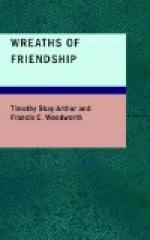Neddy, thus encouraged, gathered a handful of the sweet new hay that was scattered around, and going up to the fence, held it out and called to the horse—
“Here! Ned, Ned, Ned!”
The horse shook his head, and stood still.
“Come along, you old vagabond!” said Farmer Jones, in a voice of reproof. “Don’t you see the lad’s sorry for the cut he gave you? Now walk up to the bars, and forgive the little fellow, as a sensible horse ought to do.”
Ned no longer hesitated, but went up to the bars, where Neddy, half trembling, awaited him, and took the sweet morsel of hay from the child’s hand. Jane, encouraged by this evidence of docility, put her hand on the animal’s neck, and stroked his long head gently with her hand, while Neddy gathered handful after handful of hay, and stood close by the mouth of the old horse, as he ate it with the air of one who enjoyed himself.
After that, the children could cross the field again as freely as before, and if Ned noticed them at all, it was in a manner so good natured as not to cause them the slightest uneasiness.
THE FREED BUTTERFLY.
Yes, go, little butterfly,
Fan the warm air
With your soft silken pinions,
So brilliant and fair;
A poor, fluttering prisoner
No longer you’ll be;
There! Out of the window!
You are free—you are free!
Go, rest on the bosom
Of some favorite flower;
Go, sport in the sunlight
Your brief little hour;
For your day, at the longest,
Is scarcely a span:
Then go and enjoy it;
Be gay while you can.
As for me, I have something
More useful to do:
I must work, I must learn—
Though I play sometimes, too.
All your days with the blossoms,
Bright thing, you may
spend;
They will close with the summer,
Mine never shall end.
JULIA AND HER BIRDS.
Little Julia Cornish, a young friend of mine, is very fond of birds. It is no strange thing, I am aware, for children to love birds. Indeed, I do not see how any body can help loving the dear little things, especially those that fill the air with their music. But Julia was unusually fond of them, and her fondness showed itself in a great many ways. She did not shut them up in cages. But she was so kind to those that had their liberty, that many of them became quite as tame as if they had always lived in a cage.
I must tell you about a robin that used to be a pet of hers. You know the robin, do you not, reader? To my mind he is one of the dearest of all our native songsters. His notes are among the first we hear in the spring. And he is a very social and confiding creature. How often he selects a place for his nest on some tree near the house! and when it is built, while his partner is busy with her domestic duties, he will sing for hours together his song of love and tenderness.




